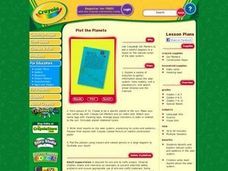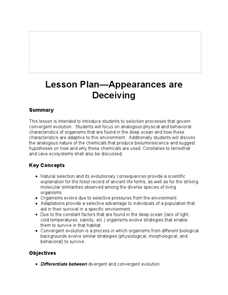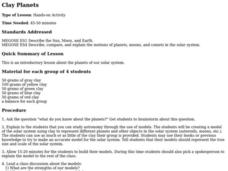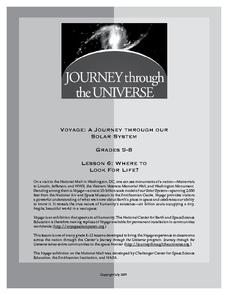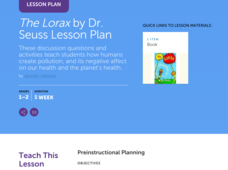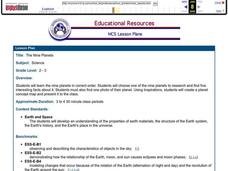Curated OER
Nine Planets
What are characteristics of a planet? With this plan, learners investigate the characteristics of the planets in our solar system. They gather research of the nine planets by using the Internet and other research tools. Then they create...
Curated OER
Planets Beyond
Students recognize basic geometric shapes. They research the positions of planets in our solar system and find information on early theories about the location of planets and the sun. Students visualize planets as they might appear in an...
Curated OER
Plot the Planets
Students identify and explain natural cycles and patterns in the solar system. They write short reports about the solar system. Students plot the order of the planets in a colorful diagram. They use Crayola Gel Markers to add a colorful...
Kelly's Kindergarten
Kelly's Kindergarten: Names of Planets
Need some helpful images for your astronomy unit? Check out a slide show that hosts several pictures of planets with their names.
Curated OER
Soccer - Lesson Plans Page
Twenty lesson plans can help you plan a soccer unit. Each of these can be clicked on individually to bring up the specific lesson. All lessons have been individually reviewed on our Lesson Planet website. This is worth checking out.
Laboratory for Atmospheric and Space Physics
The Planets and Scale
Scholars gain an insight into the relative size of planets and distance between inner and outer planets with the help of informational text, a data table, and a series of four questions.
University of Colorado
Modeling Sizes of Planets
The density of the huge planet of Saturn is 0.7 g/cm3, which means it could float in water! In the second part of 22, science pupils explore the size and order of the planets. They then calculate weight and/or gravity and density of...
Scholastic
Lesson One: The Earth, Background and Glossary
How much do you really know about our planet? Middle schoolers build up their prior knowledge about Earth, its placement in the solar system, its composition, and important geological vocabulary with an introductory earth science lesson.
Curated OER
Lesson Plan - Appearances are Deceiving
Herre is a lesson plan on divergent and convergent evolution. It has links to terrific video clips, an associate worksheet, and more. The analysis questions have been reviewed separately on Lesson Planet if you would like more...
Curated OER
Clay Planets
Have your class learn about the solar system using this hands on technique. Learners review what they know about the planets, and create a clay model of the solar system. There are a list of resource links to make this lesson a complete...
Curated OER
Galaxy Adventure
Working in groups, learners create a mnemonic device, give an oral presentation, and create a pictorial representation of the correct sequence of the planets and asteroid belt from the sun. An assessment rubric is included in the lesson...
Journey Through the Universe
Where to Look For Life?
Every year we discover new planets including more than 1,000 in 2016 alone. Will we ever find life on another planet? The activity includes two activities to help scholars understand this concept. First, they analyze the temperature...
Curated OER
Reading and Writing About the Solar System
Utilizing the classic Magic School Bus series, young scientists explore the solar system. Some excellent worksheets are included in this plan, such as Planet Roll Call and Solar System in Motion. This is an ambitious 5-day unit that...
NASA
The Science of the Sun
There's more to that glowing ball of light in sky than most children realize. From the overall structure of the solar system, to the changing of the seasons, these hands-on lessons open the eyes of young scientists to...
University of Colorado
Strange New Planet
The first remote sensors were people in hot air balloons taking photographs of Earth to make maps. Expose middle school learners to space exploration with the use of remote sensing. Groups explore and make observations of a new...
Scholastic
The Lorax by Dr. Seuss Lesson Plan
Celebrate the whimsical world of Dr. Seuss with a lesson that features the memorable tale of The Lorax. After listening to a riveting read-aloud, scholars take part in a grand conversation about the story and environment. Then...
Columbus City Schools
Planet X
How did the earth become the mass that it is now? Your young scientists explore this question through the concept of density. Their inquiries consider the impact of gravity on the formation of planets. The culminating activity of the...
Curated OER
The Nine Planets
A solid instructional activity on teaching the nine planets in our solar system is here for you. In it, young scientists learn the correct order of the planets, and they choose one of the planets to do a research report on. They must...
Laboratory for Atmospheric and Space Physics
Goldilocks and the Three Planets
Venus is the second brightest object in the night sky after the moon. Here is an interesting lesson that explores three planets — Venus, Earth, and Mars — specifically their surfaces and atmospheres. Through an analysis of their spectra,...
Laboratory for Atmospheric and Space Physics
Jupiter’s Relative Size
How do you properly illustrate the extreme size difference between two planets—Earth and Jupiter? With the help of jellybeans, of course! Create a scale model of Jupiter's mass compared to Earth using a fishbowl, 1,400 beans, and a...
Core Knowledge Foundation
The History of the Earth Tell It Again!™ Read-Aloud Anthology
A read-aloud anthology focuses on Earth's history. Over three weeks, young scholars listen to and discuss stories about the layers of the Earth, minerals, fossils, different kinds of rocks, and dinosaurs. After the lesson's text, each...
PBS
Lessons - Feeling Hot, Hot, Hot!
Volcanoes are among the most spectacular geological features on the planet. Jump into an exploration of these amazing phenomenon with this multimedia lesson series. Working collaboratively in small groups, young scientists view videos...
Curated OER
Fossil Kit I - Lesson Plan
Here is a 14-page lesson plan that deftly outlines a wonderful educational experience for your youngsters. In it, students learn about a variety of animals that have left behind clues of their existence in fossil form. Many excellent...
Curated OER
Traveling the Planets!
Fourth graders research the planets and create brochures to share their information. In this planets lesson, 4th graders navigate the Internet to gather information for a brochure about an imaginary trip to their planet....
Other popular searches
- Lesson Planet Lo Gin
- My Lesson Planet
- Planet Lesson Plans
- Google Planet Lesson Plans
- Lesson Planet Membership Fee
- Lesson planet.com
- Cost of Lesson Planet
- Lesson Planet Cost
- Creative Lesson Planet Earth
- Planets Lesson Plans
- Lesson Planet Home Page
- Lesson Planets Phone Number




